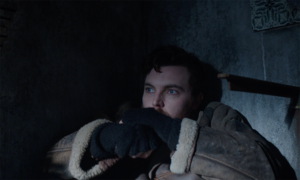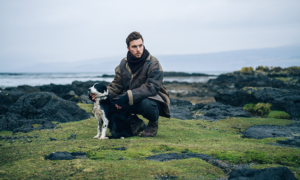Written and directed by Russell Owen, Shepherd tells the story of grief-stricken Eric (Tom Hughes, Red Joan, Victoria) who takes a job as a shepherd on a remote island to try and cope with the loss of his wife. However, when trapped alone on the majestic weather-beaten island with an ominous secret, his spiraling madness meets a vengeful supernatural force. And what’s the mysterious fisher (Kate Dickie, Game of Thrones, The Witch) got to do with it all? What starts as the perfect wind-swept escape becomes a race to save his sanity and his life…
We spoke to Owen about how the movie was based on a mysterious story from his Welsh hometown and how Shepherd fits into a wider cinematic universe…
What can you tell us about Shepherd?
It’s a psychological thriller dressed up as a horror. It’s about a man’s psychological madness, but when you try to illustrate what he’s going through, it’s a horror film. So you pick out what he’s doing in this story and you drop it into a Hammer Horror setting. Even the lightning and the sound is like a Hammer Horror movie. It’s old fashioned, it’s heightened. That’s what he’s going through. You’ve got Kate Dickie with her one eye and it’s a theatrical, slightly over-the-top, heightened reality horror film.
Even the jumps are deliberate. Originally it was going to be like The Shining and [Tom Hughes who plays Eric] plays it quite straight and pained. So you put his performance into that environment and you get this surreal feeling that you’re left with afterwards that you can go down to the pub and talk about because you’re trying to figure it out!
That’s the intention rather than just going; ‘okay let’s tick the horror boxes’. We’ve kind of ticked the horror boxes but there’s something much more going on behind the scenes…
When did you first get the idea for Shepherd?
I grew up in north Wales, just on the edge of Snowdonia. I’d always grown up with ghost stories and there were always local legends and myths and I was just absolutely obsessed with them. When I went to uni in Kent, it was my first time going to big cities, and obviously London was just a ride on the train, and I kind of craved a bit more fresh air, so I started writing about it. A sense of space.
Shepherd was the first thing I ever wrote, coming straight out of uni. Obviously, over 16 years it’s been through a million different drafts, but then I got another idea, and another idea and another and I realised that they’re all spinning off the same central themes. There was also an opportunity for characters that I’ve already written to come back and do something else. So yeah, it was always a natural gravitational pull that they all end up sharing the same universe.
What story is Shepherd based on?
I came across this story about the smallest lighthouse in Wales, which is a well-known story to me growing up. It’s the same story, shockingly, to me, Robert Eggers used for The Lighthouse. I only found out he was making that film when we were making Shepherd from Kate Dickie, who’d worked with him on The Witch and went ‘oh he’s making a film about a lighthouse’ and I went ‘oh it sounds exciting’ and then it was exactly the same source! There’s no way anyone else is making a film about a lighthouse, let alone Robert Eggers, but luckily they’re chalk and cheese. They’re different, but they share the theme of isolation.
What I’d done, is I’d taken that story and removed some of the characters so it’s just him and the dog [rather than two lighthouse keepers as in Eggers’ film], and obviously changed the job and everything. The lighthouse did stay but it became this symbol of something, rather than something that they live in. So it’s a different interpretation but I was just gobsmacked that somebody else was doing it at the same time but I was quite excited when I saw it, I’m a big fan of his.

How closely did you work with Tom on the role of Eric?
I thought that because I’ve got such a complicated character, we were going to have to spend a lot of time together to go through this with a fine-toothed comb. [But] he likes to deal with things by himself and I didn’t know what he was going to do. Knowing that almost every single frame in this film has got him in it, I shit myself. I thought ‘it’d better be good. I mean, really good’.
Then when we started filming, he literally was the character off the page. He didn’t try anything, he completely got it 100%. Right down to all the beats and the movements and the breathing. After the first take, I was like, ‘yeah, all right. Err should we do another one?’ without needing to do another one. I kept turning around to myself thinking ‘am I being shit here or is he just being really good? I can’t quite gauge’ haha.
He was brilliant. He’d gone down the rabbit hole, hook line and sinker with it. I think putting him on an island, literally going and filming on an island rather than, like, a field in Surrey… He wasn’t able to go home. He’d go back to his little remote hotel room, empty in the middle of winter and he was going mad a little bit and I think that really helped him.
What were some of the challenges you faced when shooting?
We thought it would be a really good idea to actually go to a Scottish island and shoot there. That really was a bloody challenge but the producers were up for it!
We shot it on the Isle of Mull, which is great and was accessible enough. I mean, it’s a 45-minute ferry from Oban, which is a three-hour drive from Glasgow, and when you get there, the roads are so small you can’t have big camera trucks because there are these little bridges.
So we had to set up a base somewhere and then ferry things to places. We built the cottage and the lighthouse on location in one of the most remote places in Britain. It’s never been on film, apart from I think it was on a BBC wildlife documentary for otters once and that was it.
So logistically it was a nightmare. Once everybody got there, had set up and figured it out, you had the weather. There was a hurricane that came and nearly blew everything away and destroyed the set. There were all sorts of stuff but what we got out of it… even with the opening landscape shots… it’s almost Icelandic.
It’s such a big part of the story. It’s supposed to be an illustration of his mind, so it’s vast and it’s barren and there are no trees and it’s windswept and it’s cold. Because he’s lost I needed something big to put him in. Without it being recognisably Iceland or Glencoe or somewhere like that. It needed to be somewhere random and this was like, ‘no one goes there to film because it’s so bloody difficult’. So I was like, that’s great, we need to go there to film.
You do have to push boundaries to try and get as much as you can visually. I can’t imagine it having been shot anywhere else!

What do you want for audiences to take away from the movie?
What I want people to take away, and what we’ve done deliberately at the end, is to ask: is he dead? Is he dreaming? Has he gone mad? Is he actually in that place? Are they real? Are they not?
We did a lot of work on the script and I gave all the different heads of departments different briefs. So some were working on him like he’s mad. Some as if he’s been framed and he’s under some spell. Some working as if he’s dead.
So there are all those layers if you watch it several times. Particularly with props. There are lots of props that appear and disappear in the film deliberately. So that if you’ve watched it three times (if you can bear it!) you’ll notice that there’s something there that suggests otherwise each time…
What’s next for you?
I’ve got a slate of other projects which are all set in the same universe. They’re not spin-offs but they’re follow-ups. There are a couple of character crossovers. It’s something I’ve been working on for about 16 years and have never been able to get off the ground. So yeah, we’ll see probably a bit more news on that in January…
Shepherd had its World Premiere at BFI London Film Festival and will be in UK / EIRE Cinemas from 26 November.
